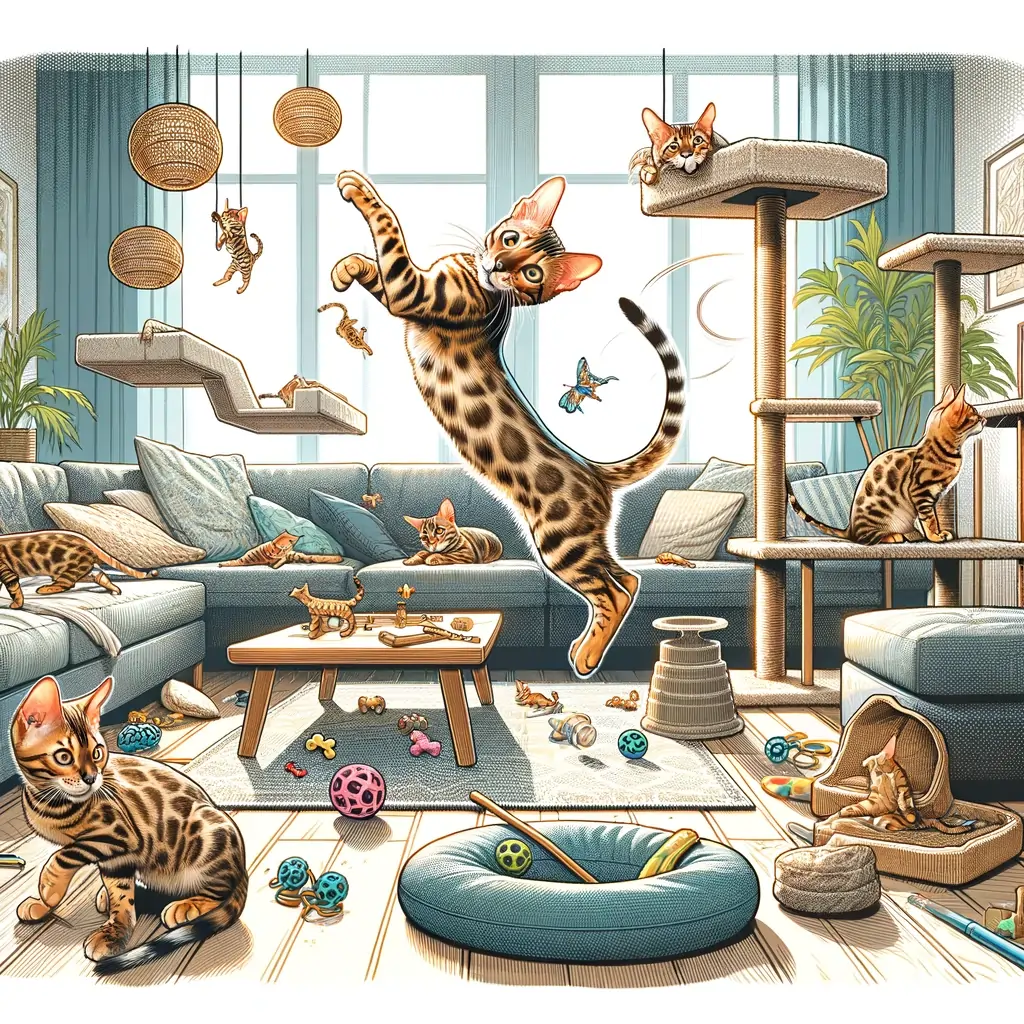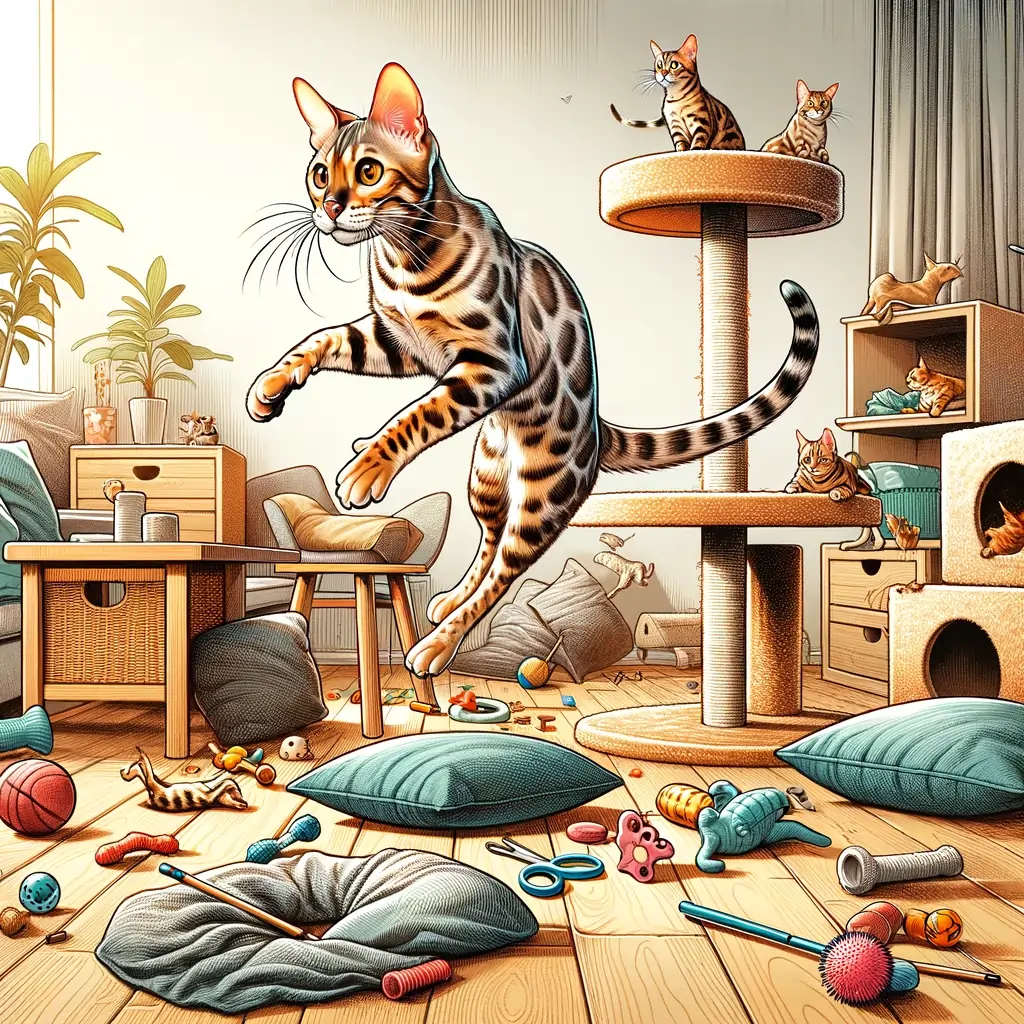Welcome to our comprehensive guide on Bengal cat personality problems and solutions. Whether you have a male or female Bengal cat, or even a black Bengal cat, it is important to understand their unique personality traits and address any behavior issues they may exhibit.
In this article, we will explore common Bengal cat behavior problems and provide effective solutions to improve their behavior.
Understanding Bengal Cat Behavior
Before we delve into the specific personality problems of Bengal cats, it is crucial to gain a deep understanding of their unique behavior. Bengal cats are a captivating breed that can trace their lineage back to the wild Asian leopard cat. This ancestry bestows upon them a blend of wild and domestic traits, influencing both their behavior and personality.
Bengal cats exhibit a range of characteristics inherited from their wild ancestor, the Asian leopard cat, as well as from their domestic cat heritage. Understanding these traits is essential in comprehending their behavior and providing the appropriate care and environment for them to thrive.
While Bengal cats are domesticated and perfectly suited for life as household pets, they may still retain certain wild instincts and behaviors. These captivating felines possess an adventurous spirit and a high level of energy, which can manifest in their playfulness, curiosity, and need for mental and physical stimulation.
As a hybrid breed, the Bengal cat breed has become renowned for its striking appearance and captivating personality. Their distinctive spotted or marbled coat patterns resemble those of their wild relatives, making them a visual delight.
Bengal cats are known for their intelligence and can quickly learn new commands and tricks. This high intelligence, combined with their natural curiosity, makes them highly trainable and adaptable. However, their intelligence can also contribute to their mischievous nature and the potential to engage in behavior that may require intervention.

Common Bengal Cat Personality Problems
Bengal cats, known for their unique and playful nature, may occasionally exhibit certain behavior issues that can challenge even the most experienced cat owners. Understanding and addressing these problems is crucial for maintaining a harmonious relationship with your Bengal companion.
1. Excessive Vocalization
Bengal cats are known for their chatterbox nature and may engage in excessive vocalization, which can be disruptive and bothersome. Whether it’s meowing, yowling, or chirping, finding ways to manage this behavior is essential for a peaceful environment.
2. Territorial Behavior
Bengals are naturally territorial creatures, and they may display possessive behavior over their living space. This can include urine marking, and aggressive behavior towards other animals, or even people. Understanding and addressing their territorial instincts is important to create a harmonious atmosphere in your home.
3. Avoiding the Litter Box
Some Bengal cats may develop a habit of avoiding the litter box, which can be a frustrating problem for cat owners. This behavior may be due to various factors like dirty litter, dislike of litter texture, or an underlying medical condition. Addressing litter box issues promptly is crucial to prevent long-term problems.
4. Scratching Furniture
Bengal cats are highly energetic and have a strong instinct to scratch. If they don’t have appropriate scratching posts or furniture alternatives, they may resort to damaging your valuable belongings. Providing them with suitable scratching posts and redirecting their behavior can help save your furniture.
5. Mischievous Behavior
Bengals are known for their mischievous nature and love for exploration. They can be curious and may get into everything, including drawers and cabinets. Establishing boundaries and providing mental and physical stimulation can help redirect their energy towards more appropriate activities.
6. Excessive Grooming
While grooming is a natural behavior, some Bengal cats may engage in excessive grooming, leading to hair loss or skin irritation. This behavior may be due to anxiety, stress, or underlying medical conditions. Identifying the cause and providing appropriate care is crucial for your Bengal’s well-being.
7. Excessive Meowing
Bengal cats are vocal creatures and can express themselves through meowing. However, excessive meowing can be a sign of boredom, loneliness, or a need for attention. Understanding their communication cues and providing mental and physical stimulation can help reduce excessive meowing.
In the next section, we will delve deeper into the underlying causes of these behavior problems and provide effective solutions to address them. By understanding your Bengal cat’s unique personality and needs, you can foster a happy and fulfilling relationship.

Understanding the Causes
To effectively address Bengal cat personality problems, it is crucial to understand the underlying causes. These causes can include medical conditions, lack of mental and physical stimulation, being left alone for extended periods, or simply fulfilling their instincts, such as exploring drawers and cabinets. Recognizing the root causes will help you tailor the solutions to your specific cat’s needs.
Solutions for Bengal Cat Personality Problems
To address Bengal cat behavior problems effectively, it’s important to implement practical solutions that cater to their unique needs. By utilizing the following strategies, you can help alleviate any personality issues and create a harmonious environment for your Bengal companion.
1. Positive Reinforcement Techniques
Positive reinforcement is a powerful tool for shaping desired behaviors in Bengal cats. Rewarding good behavior with treats, praise, or playtime can encourage them to repeat those behaviors while avoiding punishment or scolding.
2. Seek Guidance from a Veterinarian
Consulting with a veterinarian who specializes in feline behavior can provide valuable insights into addressing specific personality problems. They can evaluate your Bengal cat’s health and offer tailored suggestions to improve their behavior.
3. Provide Interactive Toys and Mental Stimulation
As highly intelligent cats, Bengals require mental stimulation to prevent boredom and destructive behaviors. Interactive toys, puzzle feeders, and regular play sessions can keep them mentally engaged and satisfied.
4. Ensure Access to Several Litter Boxes
Having multiple litter boxes available in different areas of your home can prevent litter box aversions. Bengals can be particular about their litter box cleanliness, so providing options can reduce accidents and promote proper litter box usage.
5. Maintain a Well-Balanced Diet
A well-balanced diet that meets your Bengal cat’s nutritional needs is essential for their overall health and behavior. Consult with your veterinarian to determine the appropriate diet and feeding schedule for your Bengal.
6. Offer Appropriate Scratching Posts
Bengals love to scratch and climb, so providing them with sturdy and appropriate scratching posts is crucial. Opt for posts made of sisal or natural wood that satisfy their natural instincts and protect your furniture.
7. Provide Proper Care and Attention
Bengals thrive on human interaction and companionship. Spending quality time with them, engaging in interactive play, and providing them with ample love and attention can help address any behavior issues stemming from loneliness or boredom.
Preventive Measures
Preventing behavior problems in Bengal cats is always the best approach rather than dealing with them later. By taking proactive measures, you can ensure the well-being and positive behavior of your Bengal cat. Here are some preventive measures to consider:
- Meet Their Needs: Provide a stimulating environment that meets your Bengal cat’s physical and mental needs. This includes providing plenty of toys, scratching posts, and interactive playtime.
- Address Health Concerns: Regularly take your Bengal cat for veterinary check-ups to address any potential medical causes for behavior issues. A healthy cat is a happy cat.
- Create a Conducive Environment: Set up your home in a way that prevents your Bengal cat from engaging in unwanted behaviors. For example, secure cabinets and drawers to prevent exploration.
- Respect Territory: Understand that Bengal cats can be territorial. Ensure they have their own space, such as a designated area or a cat tree, where they can retreat when they need some alone time.
In addition to these preventive measures, it is beneficial to seek insights and guidance from respected cat organizations like the International Cat Association (TICA). Their expertise can provide valuable information to help prevent behavior problems in your Bengal cat.
The Importance of Training and Socialization
Training and socialization are crucial aspects of shaping the behavior of Bengal cats. From a young age, it is essential to provide them with proper guidance and support to ensure their well-being and a harmonious relationship with their human companions.
Bengals are known for their high energy levels and intelligence. They are highly trainable, which means they can quickly learn commands and behaviors through positive reinforcement techniques. With consistent training, their natural instincts and temperament can be channeled and directed appropriately.
Understanding the breed characteristics of Bengal cats is vital when it comes to training and socialization. They have an affectionate and playful temperament, but they can also be quite mischievous and adventurous. By socializing them early on, you can help them develop appropriate behaviors and become well-rounded cats.
Benefits of Training
Training your Bengal cat offers numerous benefits. It helps prevent destructive behaviors such as excessive scratching or improper litter box usage. Training also promotes mental stimulation, which is crucial for a cat as intelligent as the Bengal breed. Engaging their minds through interactive play and puzzle toys can prevent boredom and curb unwanted behaviors.
Additionally, training allows you to establish a strong bond with your Bengal cat. It fosters communication and trust between you and your pet, creating a deeper connection. The more your cat understands your expectations and boundaries, the happier and more confident they will be.
Importance of Socialization
Socializing Bengal cats is equally important as training. Exposing them to various people, animals, and environments at an early age helps them become well-adjusted and confident in different situations. Socialization reduces their tendency towards fear or aggression, making them more friendly and comfortable around strangers and other pets.
Introducing your Bengal cat to new experiences gradually and positively reinforces their social skills. Take them on supervised outings, allow them to meet friendly animals, and expose them to different sounds and sights. Positive interactions during socialization lay the foundation for a calm and sociable Bengal cat throughout their life.
Remember, training and socialization should always be approached with patience, consistency, and positive reinforcement. It’s essential to understand your Bengal cat’s individual temperament and adapt your training methods accordingly. By investing time in their training and socialization, you are setting the stage for a well-behaved and happy Bengal cat.
Conclusion
Understanding Bengal cats and their unique personality problems is essential for cat lovers. These beautiful cat breeds, known for their loud and distinctive markings, may require extra care and attention, but they can make incredible companions for anyone willing to provide the proper care and training.
Bengal cats are not your typical cats; they are a breed that combines the characteristics of wild cats, such as the Asian leopard cat, with domestic cat traits. Their high energy levels, intelligence, and mischievous nature can sometimes lead to behavior issues, such as excessive meowing or scratching furniture. However, with the right approach and proper care, these problems can be effectively managed.
To ensure the well-being of Bengal cats, it is crucial to provide mental and physical stimulation, with interactive toys and appropriate scratching posts. A well-balanced diet and regular veterinary check-ups are also important for their overall health and happiness. Additionally, positive reinforcement techniques can be used to train Bengal cats and help address any behavior problems that may arise.
Bengal cats can be a wonderful addition to any cat lover’s home. With their unique personalities and playful nature, they bring joy and excitement to our lives. By understanding their specific needs, providing the necessary care, and implementing the right solutions, we can build a strong bond with these amazing feline companions.

Hey guys, My name is Simon Smith. I’m from Canada and live near Victoria
I live with my sweet family and have 20+ Ragdolls of different types. I love them as my own children. My profession is as a hotel manager.
I love to keep Ragdolls and grow their breeder case. I have 7 years of experience.
I’m an expert in cat care. So, I’m here to provide you with new information about my cats daily. This is my personal blog website, so I request that you kindly visit our site daily.
If you’re a Ragdolls lover and you have any questions or confusion about cats, text me on the Contact Us page or Gmail.
Thank u
